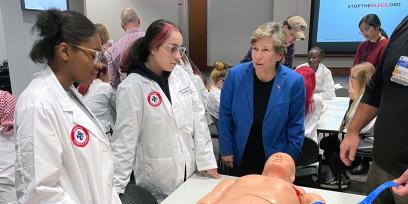WE ARE IN a time of high anxiety, and perhaps no one feels that more acutely than children and families—and their teachers. Gun violence, social media, COVID-19, economic concerns, political and cultural divisiveness, and so much more all fuel worries about our young people’s well-being. Over the last few years, extremists have sought to exploit parents’ anxiety to advance their political and ideological agendas. But on November 7, voters rejected extremist politicians and school board candidates running on culture-war agendas grounded in divisiveness, fear, and smears. Majorities of mainstream parents supported candidates who champion public schools that are safe and supportive for all students and that provide a robust curriculum and the resources needed to help young people recover and thrive.
When public education was on the ballot, public education won. An AFT analysis of approximately 250 races where the far right backed anti-public education candidates found that AFT-supported candidates won over 80 percent of the time. Anti-public education candidates publicly supported by Moms for Liberty and the 1776 Project PAC lost 75 percent of the time.
The results underline what families have been telling us for the last two years: Families want their kids to get a well-rounded education, develop strong fundamental academic and life skills, and have pathways to career, college, and beyond. They want a voice in their kids’ education, but that doesn’t mean banning books or censoring curriculum. They value and want to work with their kids’ teachers. So, when extremists peddled fear or tried to smear and divide, they lost voters’ support.
This did not surprise me. I am in schools across the country all the time, constantly talking with students, educators, parents, and community members. They want strong, supported public schools. They want young people to be able to discuss complex issues and bridge differences. They want students to have access to tools and curriculum that address the challenges of today and that prepare them for the opportunities of today and tomorrow.
That’s the goal of the AFT’s Real Solutions for Kids and Communities campaign, which aims to tackle learning loss, loneliness, and literacy challenges. Our campaign focuses on key strategies to create joyful and confident readers; care for young people’s mental health; expand community schools; engage students in their learning through hands-on experiences, including career and technical education; and secure the investments public schools need—for improved teaching and learning conditions, adequate staffing, fair pay for teachers and school staff, and other fundamentals for a high-quality education in every school. (Learn more at aft.org/realsolutions.)
In just the past several weeks, I’ve seen so many examples of this. Students at Saunders Trades and Technical High School in Yonkers, New York, can get hands-on experience in fields as far-ranging as architecture, biochemistry, auto mechanics, and cosmetology. At Lincoln-West School of Science and Health in Cleveland, which is located in a hospital, students can get valuable immersive experiences leading to in-demand careers. In Beaverton, Oregon, I saw a fantastic literacy program and the many ways school staff are providing social and emotional supports for students. And, in one weekend alone, the AFT gave kids and families 120,000 free books, through the AFT Reading Opens the World program, at book fairs in Houston and in Queens and Webster, New York. (The AFT and First Book have given away more than nine million great, diverse books—and counting.)
The AFT is also fighting for higher education access and quality by protecting intellectual freedom, organizing to improve wages and conditions for adjunct faculty, and reducing student debt. (Learn more at aft.org/highered.)
Contrast any of these programs for young people with the extremists who work so hard to divide people and undermine public schools and colleges but offer nothing to help students develop the skills and knowledge they need to succeed in life.
These election results should be enough to retire the myth that entities like Moms for Liberty, which the Southern Poverty Law Center includes on its list of extremist groups, represent the majority of this country’s parents. AFT members and our partners in groups like Moms-Rising, ParentsTogether, Red Wine & Blue, and the Campaign for Our Shared Future represent tens of millions of Americans.
Families and educators are together on team humanity, strengthening public education and helping all our children get the well-rounded education they deserve in the safe, welcoming, and supportive environments they need.
[Photo by Alex Palombo]

